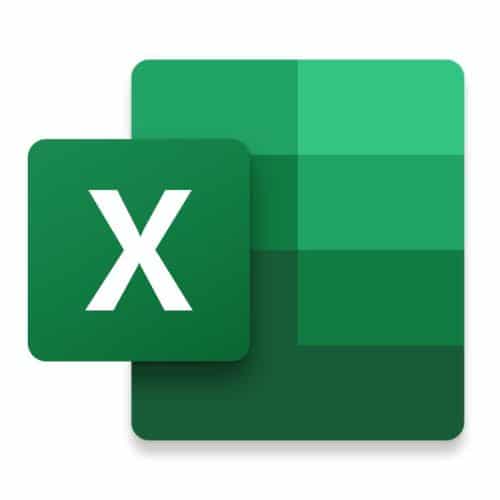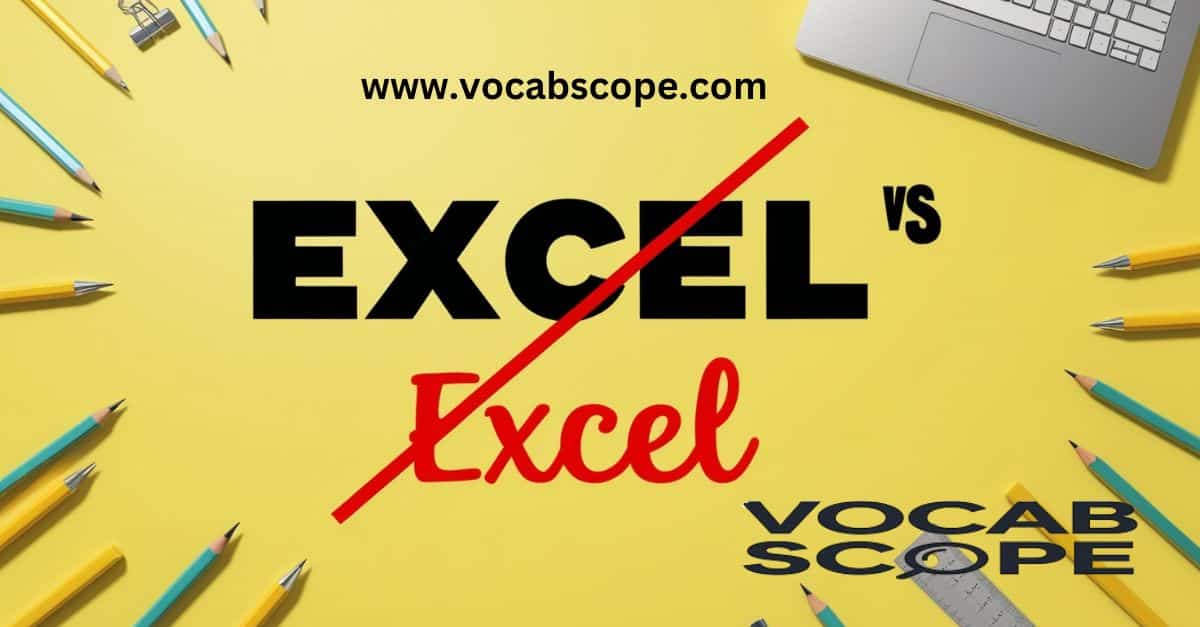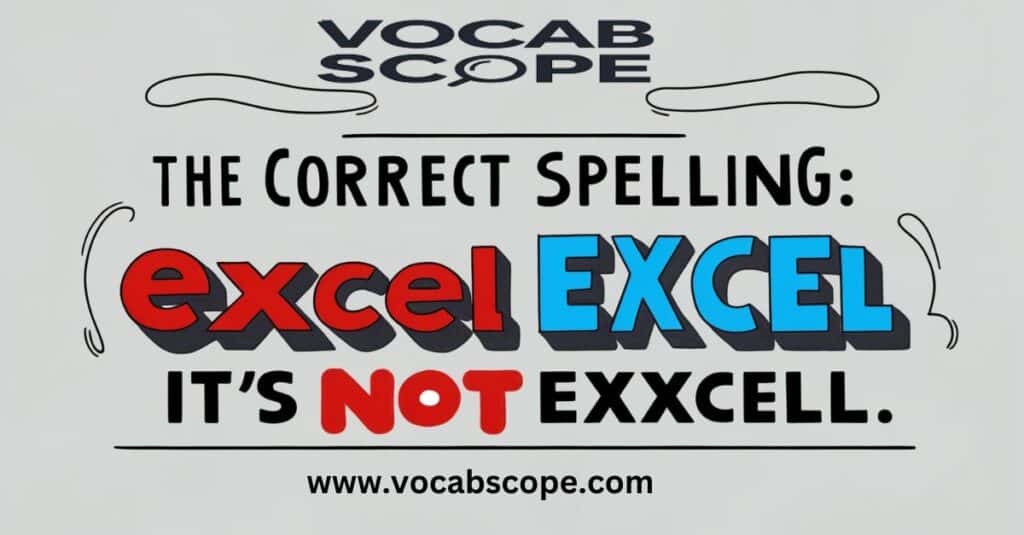“Excell” and “Excel” may look similar, but only one is correct. “Excel” is the right spelling, meaning to surpass or be outstanding. “Excell” is simply a misspelling.
Choosing between “Excell” and “Excel” can be confusing. If you’re aiming for accuracy, knowing the correct spelling is key. “Excel” is the word you should use.
When deciding on “Excell” or “Excel,” remember that only “Excel” is correct. It ensures your writing is professional and error-free.
Excel: To perform exceptionally well or surpass others in a particular area.
Excell: An incorrect spelling of “excel,” not used in standard English.
“Excel. E-X-C-E-L. Excel.”
Excel: This term, therefore, refers to both the verb meaning to surpass others in performance and, in addition, to Microsoft Excel, a popular software application used for creating spreadsheets, managing data, and performing complex calculations.
Excell: This is a common misspelling of “excel” and does not have any recognized usage in standard English. It is often mistakenly used due to confusion with the Microsoft software’s name.
Read More: Cacoon or Cocoon: Which Spelling is Correct?
Origins of the word “Excel”

The word “excel” comes from the Latin term “excellere,” which means to rise or surpass. It combines “ex” meaning “out of” or “from,” and “cellere,” meaning “to rise” or “project.” Over time, this evolved into the Old French word “excellence,” which then influenced modern English.
In English, “excel” became widely used to describe outstanding performance or skill. It reflects the idea of going beyond average expectations. Today, it’s commonly used in both everyday speech and formal writing to describe someone who performs exceptionally well in a particular area.
Synonyms Table for “Excel”
| Synonyms | Meanings |
|---|---|
| Surpass | To go beyond or exceed expectations |
| Outperform | To perform better than others |
| Shine | To stand out due to excellent performance |
| Be outstanding | To be notably superior or excellent |
| Exceed | To go beyond in quality or achievement |
| Thrive | To flourish or succeed in a specific area |
| Be superior | To be better than others |
| Be exceptional | To be unusually excellent or extraordinary |
| Be proficient | To be highly skilled or competent |
| Lead | To be at the forefront or ahead of others |
Uses in Context
Excel:
- Sarah continues to excel in her studies, consistently earning top grades.
- The team used Microsoft Excel to organize and analyze the financial data.
Excell:
- “Excell” is a common misspelling of the word “excel,” and it is not accepted in standard English.
- If you write “excell” instead of “excel,” it will be considered a typo in your document.
Tenses of the Verb ‘Excel’ with Examples
| Tense | Form of “Excel” | Example Sentence |
|---|---|---|
| Present Simple | excel / excels | They excel at mathematics. She excels in public speaking. |
| Present Continuous | am / is / are excelling | I am excelling in my new job. They are excelling in their studies. |
| Present Perfect | have / has excelled | She has excelled in every exam so far. We have excelled this year. |
| Present Perfect Continuous | have / has been excelling | They have been excelling in their training all week. |
| Past Simple | excelled | He excelled in last year’s competition. |
| Past Continuous | was / were excelling | They were excelling in the tournament before it was canceled. |
| Past Perfect | had excelled | By the time the teacher arrived, I had excelled in completing the test. |
| Past Perfect Continuous | had been excelling | She had been excelling in her role before she changed departments. |
| Future Simple | will excel | You will excel in your future career. |
| Future Continuous | will be excelling | By this time next year, he will be excelling in his new business. |
| Future Perfect | will have excelled | By the end of the course, they will have excelled in their skills. |
| Future Perfect Continuous | will have been excelling | Next month, I will have been excelling in this position for three years. |
Excell (with double ‘l’)
Incorrect Usage:
- She wants to excell in her studies.
- He always tries to excell in sports.
Explanation:
Using “excell” is incorrect when referring to the verb. The proper spelling is “excel” (with one “l”). People often mistakenly add an extra “l” when they mean the verb form of “excel”.
You will like: totalling-or-totaling-which-spelling-to-use
Excel (with one ‘l’)
Correct Usage (Verb):
- She wants to excel in her studies.
- He always tries to excel in sports.
Explanation:
“Excel” as a verb means to be outstanding or to surpass others in a particular activity or subject. For instance, in these examples, the word is used correctly to indicate that someone aims to perform exceptionally well. As a result, it highlights their determination to achieve excellence.
Excel as the Software Program
Correct Usage:
- I need to update the spreadsheet in Excel for tomorrow’s meeting.
- We use Excel to track our monthly expenses.
Explanation:
Here, “Excel” refers to Microsoft Excel, a popular spreadsheet software. Specifically, it’s used for organizing data, performing calculations, and creating charts. Therefore, since it’s a proper noun, it should always be capitalized.
Excell (with double ‘l’) as a Verb
Incorrect Usage:
- He hopes to excell in his new role at work.
- If you work hard, you will excell in your studies.
Explanation:
The spelling “excell” with double “l” is incorrect as a verb. There is no verb form in English that uses this spelling. It’s a common misspelling people make when they mistakenly think the verb form should have an extra “l.”
Excel (with one ‘l’) as a Verb
Correct Usage:
- He hopes to excel in his new role at work.
- If you work hard, you will excel in your studies.
Explanation:
The correct verb form is “excel” with one “l”. In other words, it means to perform exceptionally well or surpass others in a certain area. For instance, in both examples, “excel” is used to describe someone aiming to do very well in a task or subject.
Key Points for the Verb:
- “Excell” is always incorrect as a verb.
- “Excel” is the correct form and should be used when talking about doing well or surpassing expectations in any field.
Synonyms for “Excel” as a Verb:
- Outperform: She always outperforms her peers in math competitions.
- Surpass: His dedication to training helped him surpass all expectations.
- Outshine: With her talent, she continues to outshine the competition.
- Exceed: They consistently exceed the goals set by the team.
Comparison Table
| Word | Usage | Example Sentence |
| Excell (incorrect) | Incorrect verb spelling | She wants to excell in her studies. |
| Excel (verb) | Correct verb spelling | He always tries to excel in sports. |
| Excel (software) | Software program name | We’re using Excel to analyze the sales report. |
| Excell (non-standard)** | Occasionally used as a surname or company name | John Excell is attending the conference. |
Key Differences:
- “Excell” is not the correct spelling when referring to the verb form, but it could be seen in names (like surnames or businesses).
- “Excel” (with one “l”) is the correct spelling for both the verb and the software program.
Read About: Accel or Excel: What Is the Correct Spelling?
Understanding the Correct Spelling
The term “excel” is the right spelling, and it refers to being outstanding or superior in some skill or field. This verb is derived from the Latin word “excellere,” which means to rise or surpass. So, when you want to say someone is really good at something, use “excel.”
For example, if you’re describing someone who performs exceptionally well in mathematics, you might say, "She really excels in math."
A Tale of Two Meanings
Here’s where things get interesting. While “Excel” with one ‘l’ is absolutely the right choice for the software, there’s actually a legit reason why some folks might be tempted to double up on those l’s. Let’s break it down:
Excel (verb): To be exceptionally good at something; to surpass others. Example: “Sarah excels at public speaking.”
Excel (noun): The Microsoft spreadsheet program. Example: “I need to update the budget in Excel.”
Now, here’s the kicker. There’s an old-fashioned spelling of the verb form that goes:
- Excell (verb): An archaic spelling of “excel.”
This outdated version is where a lot of the confusion stems from. It’s like a linguistic fossil – interesting to look at, but not really useful in modern times.
The Correct Spelling: It’s Excel, Not Excell

First things first: the correct spelling is Excel, with a single ‘l’. We’ve ingrained Microsoft Excel into our daily lives so deeply that it’s almost become a household name. But why do so many people get it wrong?
The misspelling “excell” often crops up because it looks like it should be right. After all, we have words like “cell” and “sell” with double L’s. But in this case, less is more.
The name “Excel” is actually derived from the word “excellent,” which, in turn, gives us a clue about its spelling – as well as its ambitions of being great at what it does.
Real-World Scenarios: The Impact of Correct Spelling
Let’s look at some scenarios where the correct spelling of Excel can make a big difference:
- Job Applications: Imagine you’re applying for a finance position and list “Proficient in Microsoft Excell” on your resume. This misspelling might make the hiring manager question your attention to detail – not a great first impression!
- Marketing Materials: A company creates brochures advertising their “Excell training courses.” Potential clients might wonder if the company really knows the software they’re teaching.
- Academic Papers: A student submits a research paper with data analysis “performed using Microsoft Excell.” The professor might dock points for improper citation and question the student’s familiarity with the tools they used.
These examples highlight how a simple spelling error can affect communication and understanding in professional and academic contexts.
- undermine the letter’s credibility.
Table of Differences Between ‘Excel’ and ‘Excell’
| Aspect | Excel | Excell |
| Correct Spelling | Yes | No |
| Meaning | To perform exceptionally well | Incorrect spelling |
| Usage | Commonly used in various contexts | Not used in standard English |
| Software | Name of a widely-used Microsoft program | Not related to any software |
The term “excel” has its roots in Latin, derived from “excellere,” which means to rise or to surpass. It has evolved into a word used to signify excellence and outstanding performance. When we say someone excels, we are acknowledging their superior ability or achievement.
A Table of Differences
To further clarify, let’s look at a table that breaks down the uses of “Excel” and “Excell”:
| Word | Part of Speech | Meaning | Example Usage |
| Excel | Verb | To be exceptionally good at something | She excels in mathematics. |
| Excel | Noun | Microsoft spreadsheet software | I’ll create the budget using Excel. |
| Excel | Adjective | Abbreviated form of “Excellent” (informal) | That performance was excel! |
| Excell | Verb | Archaic spelling of “excel” (not used today) | [No modern usage] |
Wrapping It Up: The Final Word on Excel(l)
In the grand scheme of things, confusing “Excel” and “Excell” isn’t the end of the world. But understanding the difference can save you from some awkward moments and help you communicate more effectively.
Remember:
- Excel (one ‘l’) is both a verb meaning to be great at something and the name of Microsoft’s spreadsheet software.
- “Excell” with (two l’s) belongs in the dusty corners of old dictionaries and is outdated.
Whether you’re aiming to excel in your career, master the ins and outs of Excel software, or simply want to nail your spelling, keeping these distinctions in mind will serve you well.
So go forth and excel – in your spelling, in your spreadsheet skills, and in all your endeavors. Just remember to keep it down to one ‘l’ when you’re bragging about your Excel expertise!
Summary,
In the grand scheme of things, misspelling “Excel” as “Excell” might seem like a minor error. However, in a world that values effective communication and attention to detail, you need to get it right.
Remember, it’s Excel – with one ‘l’ – that helps us excel in our work and studies. In fact, this widely-used software continues to be a cornerstone of modern productivity tools, and it’s great at what it does: helping us organize, analyze, and understand our data.
So, the next time you’re about to type “Excell” in your document or email, pause for a moment. That single ‘l’ in Excel represents not just correct spelling, but a gateway to more effective work, clearer communication, and deeper understanding of the data that drives our world.

“Robert Henry is an experienced blogger with a passion for language and education. His insightful posts on Vocab Scope offer readers valuable tips on vocabulary and grammar. With a background in linguistics and a knack for clear, engaging writing, Robert is dedicated to helping others enhance their communication skills.”






